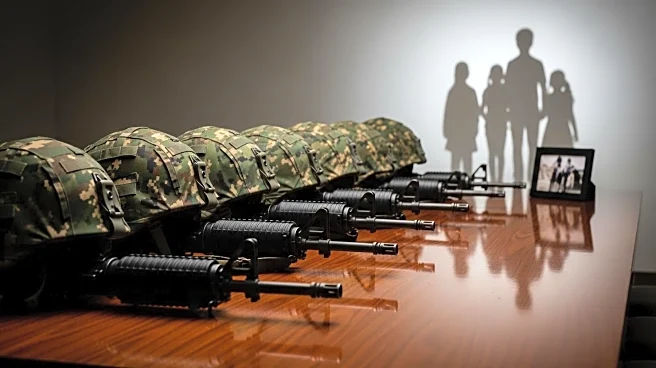What's Happening?
Approximately 40,000 Israeli reservists are being mobilized under emergency orders for a large-scale offensive in Gaza, known as Operation Gideon’s Chariots II. This mobilization comes as many reservists, like Asher Shushan and Udi Tenne, balance their military duties with family responsibilities. Shushan, who has already served over 250 days in reserve duty, is preparing to leave his family once again to join the operation. Despite the emotional and logistical challenges, he and his wife, Nirit, are committed to the cause, emphasizing the defense of their homeland. Similarly, Tenne, a reservist officer and civilian strategic consultant, has completed over 500 days of service since October 7 and is prepared to continue serving to achieve a decisive victory. The mobilization reflects the ongoing tensions and the need for a robust military response to threats from Gaza.
Why It's Important?
The mobilization of such a large number of reservists underscores the severity of the security situation in Israel and the ongoing conflict with Hamas in Gaza. This operation is significant as it highlights the personal sacrifices made by reservists and their families, who bear the emotional and practical burdens of repeated deployments. The situation also raises questions about the sustainability of such military commitments and the broader impact on Israeli society, particularly as it relates to the involvement of different community sectors, such as the ultra-Orthodox. The outcome of this offensive could have lasting implications for regional stability and the future of Israeli-Palestinian relations.
What's Next?
As the operation progresses, the Israeli military will likely continue to assess the effectiveness of their strategies and the level of participation among reservists. The government and military leaders may face pressure to ensure that the objectives of the operation are met decisively to prevent future conflicts. Additionally, there may be calls for a more equitable distribution of military service responsibilities across different segments of Israeli society. The international community will also be watching closely, as the outcome could influence diplomatic efforts and peace negotiations in the region.
Beyond the Headlines
The ongoing conflict and mobilization efforts highlight deeper issues within Israeli society, such as the integration of various communities into national service and the long-term psychological impact on families of reservists. The repeated call-ups and the strain on families could lead to discussions about military service policies and support systems for those affected. Furthermore, the operation's success or failure could shape public opinion and political discourse in Israel, potentially influencing future elections and government policies.









